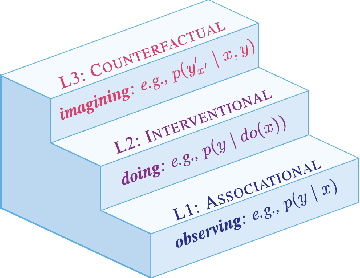Jacqueline Maasch
CausalARC: Abstract Reasoning with Causal World Models
Sep 03, 2025



Abstract:Reasoning requires adaptation to novel problem settings under limited data and distribution shift. This work introduces CausalARC: an experimental testbed for AI reasoning in low-data and out-of-distribution regimes, modeled after the Abstraction and Reasoning Corpus (ARC). Each CausalARC reasoning task is sampled from a fully specified causal world model, formally expressed as a structural causal model. Principled data augmentations provide observational, interventional, and counterfactual feedback about the world model in the form of few-shot, in-context learning demonstrations. As a proof-of-concept, we illustrate the use of CausalARC for four language model evaluation settings: (1) abstract reasoning with test-time training, (2) counterfactual reasoning with in-context learning, (3) program synthesis, and (4) causal discovery with logical reasoning.
Probabilistic Graphical Models: A Concise Tutorial
Jul 23, 2025Abstract:Probabilistic graphical modeling is a branch of machine learning that uses probability distributions to describe the world, make predictions, and support decision-making under uncertainty. Underlying this modeling framework is an elegant body of theory that bridges two mathematical traditions: probability and graph theory. This framework provides compact yet expressive representations of joint probability distributions, yielding powerful generative models for probabilistic reasoning. This tutorial provides a concise introduction to the formalisms, methods, and applications of this modeling framework. After a review of basic probability and graph theory, we explore three dominant themes: (1) the representation of multivariate distributions in the intuitive visual language of graphs, (2) algorithms for learning model parameters and graphical structures from data, and (3) algorithms for inference, both exact and approximate.
Reasoning Elicitation in Language Models via Counterfactual Feedback
Oct 02, 2024



Abstract:Despite the increasing effectiveness of language models, their reasoning capabilities remain underdeveloped. In particular, causal reasoning through counterfactual question answering is lacking. This work aims to bridge this gap. We first derive novel metrics that balance accuracy in factual and counterfactual questions, capturing a more complete view of the reasoning abilities of language models than traditional factual-only based metrics. Second, we propose several fine-tuning approaches that aim to elicit better reasoning mechanisms, in the sense of the proposed metrics. Finally, we evaluate the performance of the fine-tuned language models in a variety of realistic scenarios. In particular, we investigate to what extent our fine-tuning approaches systemically achieve better generalization with respect to the base models in several problems that require, among others, inductive and deductive reasoning capabilities.
Local Causal Discovery for Structural Evidence of Direct Discrimination
May 23, 2024Abstract:Fairness is a critical objective in policy design and algorithmic decision-making. Identifying the causal pathways of unfairness requires knowledge of the underlying structural causal model, which may be incomplete or unavailable. This limits the practicality of causal fairness analysis in complex or low-knowledge domains. To mitigate this practicality gap, we advocate for developing efficient causal discovery methods for fairness applications. To this end, we introduce local discovery for direct discrimination (LD3): a polynomial-time algorithm that recovers structural evidence of direct discrimination. LD3 performs a linear number of conditional independence tests with respect to variable set size. Moreover, we propose a graphical criterion for identifying the weighted controlled direct effect (CDE), a qualitative measure of direct discrimination. We prove that this criterion is satisfied by the knowledge returned by LD3, increasing the accessibility of the weighted CDE as a causal fairness measure. Taking liver transplant allocation as a case study, we highlight the potential impact of LD3 for modeling fairness in complex decision systems. Results on real-world data demonstrate more plausible causal relations than baselines, which took 197x to 5870x longer to execute.
Local Discovery by Partitioning: Polynomial-Time Causal Discovery Around Exposure-Outcome Pairs
Oct 25, 2023



Abstract:This work addresses the problem of automated covariate selection under limited prior knowledge. Given an exposure-outcome pair {X,Y} and a variable set Z of unknown causal structure, the Local Discovery by Partitioning (LDP) algorithm partitions Z into subsets defined by their relation to {X,Y}. We enumerate eight exhaustive and mutually exclusive partitions of any arbitrary Z and leverage this taxonomy to differentiate confounders from other variable types. LDP is motivated by valid adjustment set identification, but avoids the pretreatment assumption commonly made by automated covariate selection methods. We provide theoretical guarantees that LDP returns a valid adjustment set for any Z that meets sufficient graphical conditions. Under stronger conditions, we prove that partition labels are asymptotically correct. Total independence tests is worst-case quadratic in |Z|, with sub-quadratic runtimes observed empirically. We numerically validate our theoretical guarantees on synthetic and semi-synthetic graphs. Adjustment sets from LDP yield less biased and more precise average treatment effect estimates than baselines, with LDP outperforming on confounder recall, test count, and runtime for valid adjustment set discovery.
 Add to Chrome
Add to Chrome Add to Firefox
Add to Firefox Add to Edge
Add to Edge